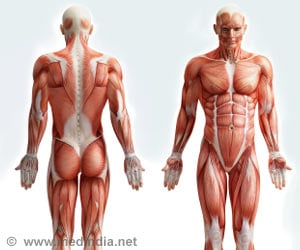Drugs that promote the activity of AMP-activated protein kinase (AMPK), an important fuel-sensing enzyme could be used in Duchenne muscular dystrophy (DMD).

‘New study highlights the therapeutic potential of AMP-activated protein kinase (AMPK) activators in Duchenne muscular dystrophy (DMD), and other neuromuscular diseases.’





However, first-generation AMPK activators have failed to translate due to either their lack of potency or toxic, off-target effects. The identification of safe and efficacious molecules that stimulate AMPK in dystrophic muscle is of particular importance as it may broaden the therapeutic landscape for DMD patients.Could a New Drug Slow or Reverse the Effects of Duchenne Muscular Dystrophy?
In this new study, scientists utilized a next-generation oral AMPK agonist called MK-8722 and showed that when given as a single dose to mice with muscular dystrophy, it triggered signaling pathways associated with improved muscle health.Specifically, MK elicited a gene expression profile indicative of a more disease-resistant slow, oxidative phenotype including increased peroxisome proliferator-activated receptor ɣ coactivator-1⍺ activity and utrophin levels.
In addition, they also observed pharmacological AMPK stimulation normalizes the expression of myogenic regulatory factors and amends activated muscle stem cell content in mdx muscle. Additional studies are needed to test the chronic administration of such next-generation AMPK activators in dystrophic animals to further examine their safety and effectiveness.
Researchers hope that these findings can be extended to other novel AMPK agonists that are currently being investigated in ongoing clinical trials. If so, repositioning these therapies may pose a cost-effective and efficacious method for the treatment of DMD regardless of the specific disease-causing mutation.
Advertisement











